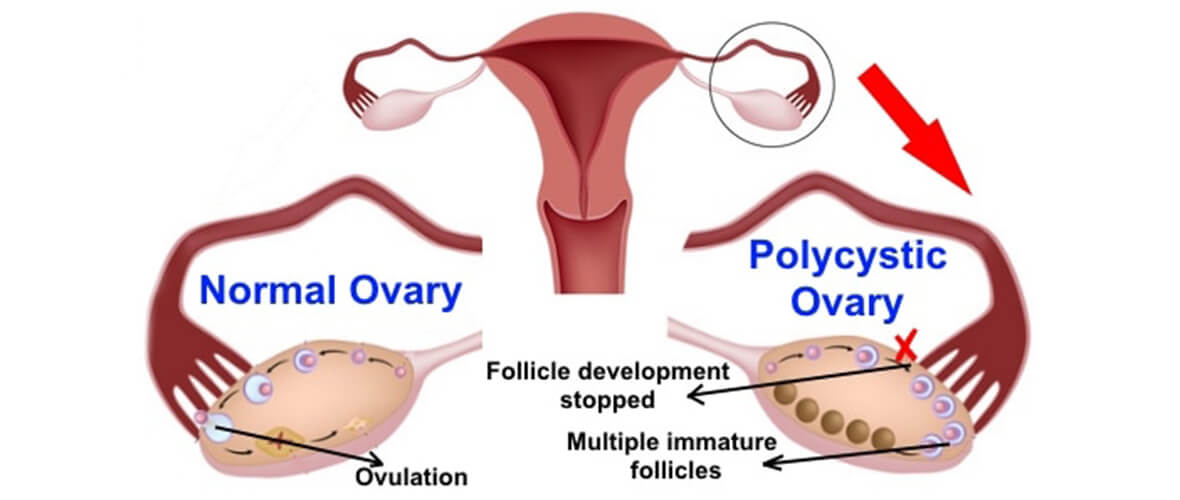Polycystic ovary syndrome (PCOS) is a hormonal disorder that is common among women of reproductive age. PCOS affects a woman’s menstrual cycle, fertility, insulin production, circulatory system, and appearance. Women have both male and female hormones, but women who have PCOS have higher levels of male hormones and experience irregular or absent menstrual cycles and small-fluid filled cysts on their ovaries. It is estimated that 5% to 10% of women who are of childbearing age have PCOS.
What are the causes of Polycystic Ovary Syndrome (PCOS)?
Unfortunately, the exact cause of PCOS is unknown. There may be a genetic factor with PCOS, but further testing is needed. Many women who have PCOS also struggle with weight issues; researchers are currently investigating a correlation between the body’s ability to make insulin and PCOS. A symptom of PCOS is that the body produces too much insulin. This can result in excess production of male hormones which can cause acne, hair growth, weight gain, and ovulation issues.
What are the symptoms?
The symptoms of PCOS include:
- Infrequent, irregular, or absent menstrual cycles. You might have fewer than nine periods a year with more than 35 days between periods. Other women have abnormally heavy periods.
- Infertility due to irregular or absent ovulation
- Increased hair growth on face, neck, stomach, back, hands, and feet due to elevated levels of male hormones
- Acne, oily skin, and dandruff
- Pelvic pain
- Weight gain/obesity- normally around the waist
- High cholesterol
- High blood pressure
- Thinning hair
- Skin tags located on the neck or armpits
- Dark or thick skin located on the neck, arms, thighs, and/or breasts
- Sleep apnea
How is it diagnosed?
Unfortunately, there is not a specific test to diagnose PCOS at this time. Normally a diagnosis of PCOS is reached after your health care provider has taken a medical history, performed a physical exam, pelvic exam, ultrasound, and various blood tests. The blood tests check hormone and glucose (sugar) levels. During the physical examination, the health care provider will examine the ovaries and uterine lining. Any abnormal findings are often verified by an ultrasound.
What treatments are available for women who have been diagnosed with Polycystic Ovary Syndrome (PCOS)?
There is no cure for PCOS, but it can be managed so that other problems are prevented. The treatment plan is determined by the symptoms that a woman is experiencing. A health care provider may use one plan or a combination of plans, depending on a woman’s situation.
The following list includes common treatment options:
- Healthy lifestyle and weight- Maintaining a healthy weight is also a way to manage PCOS. A healthy diet and exercise can manage weight, help the body to use insulin more effectively, lower glucose levels, and help regulate periods.
- Birth control pills – Women who are not trying to conceive may find it beneficial to begin taking birth control pills. These can help regulate periods and improve acne and hair growth. Symptoms can return if a woman stops taking the pills. Birth control pills containing only progesterone can help with the irregular periods but will not help with acne or abnormal hair growth.
- Fertility medications – The primary fertility problem with PCOS is the lack of ovulation. However, additional fertility testing may be completed to make sure that there are no other problems present. Different medications can be prescribed to help the ovaries release eggs, but women who take such medications need to know that they are at an increased risk for multiple pregnancies. In vitro fertilization (IVF) can also be used to help a woman with PCOS conceive.
- Diabetes medications – Metformin/Glucophage can regulate the production of glucose and male hormones. The abnormal hair growth should slow down, and ovulation may return in a few months. Taking metformin will not cause a person to become diabetic.
- Medication for increased hair growth or too many male hormones – These medications should only be used if a woman is not trying to become pregnant. Non-medical treatments such as electrolysis or laser hair removal are effective in treating unwanted hair. Hormones can be taken to prevent new hair from growing. If a woman is pregnant or trying to conceive, she needs to consult with her health care provider before undergoing any kind of hair treatment for unwanted hair.
- Surgery – While surgery is not normally used as the first line of treatment, a laparoscopic procedure (in which a small electric current is applied to the ovary) may be considered. A small portion of the ovary is destroyed which can decrease the production of male hormones and increase ovulation. It will not help with excessive hair growth and also carries the risk of scar tissue forming on the ovaries. Normally, results only last a few months, and then the symptoms return.
How can polycystic ovary syndrome (PCOS) affect pregnancy?
Women who have PCOS appear to have an increased risk of miscarriage, pregnancy-induced hypertension, gestational diabetes, and premature delivery.
Can polycystic ovary syndrome (PCOS) place a woman at risk for any other conditions?
Women who have been diagnosed with PCOS seem to be at a greater risk of developing endometrial cancer, diabetes, high blood pressure, high cholesterol, and heart disease. Getting symptoms controlled as soon as possible can decrease a woman’s chance of developing any of these other conditions.
For more information or support regarding PCOS contact:
Compiled using information from the following sources:
Polycystic Ovarian Syndrome Association,
Office on Women’s Health






